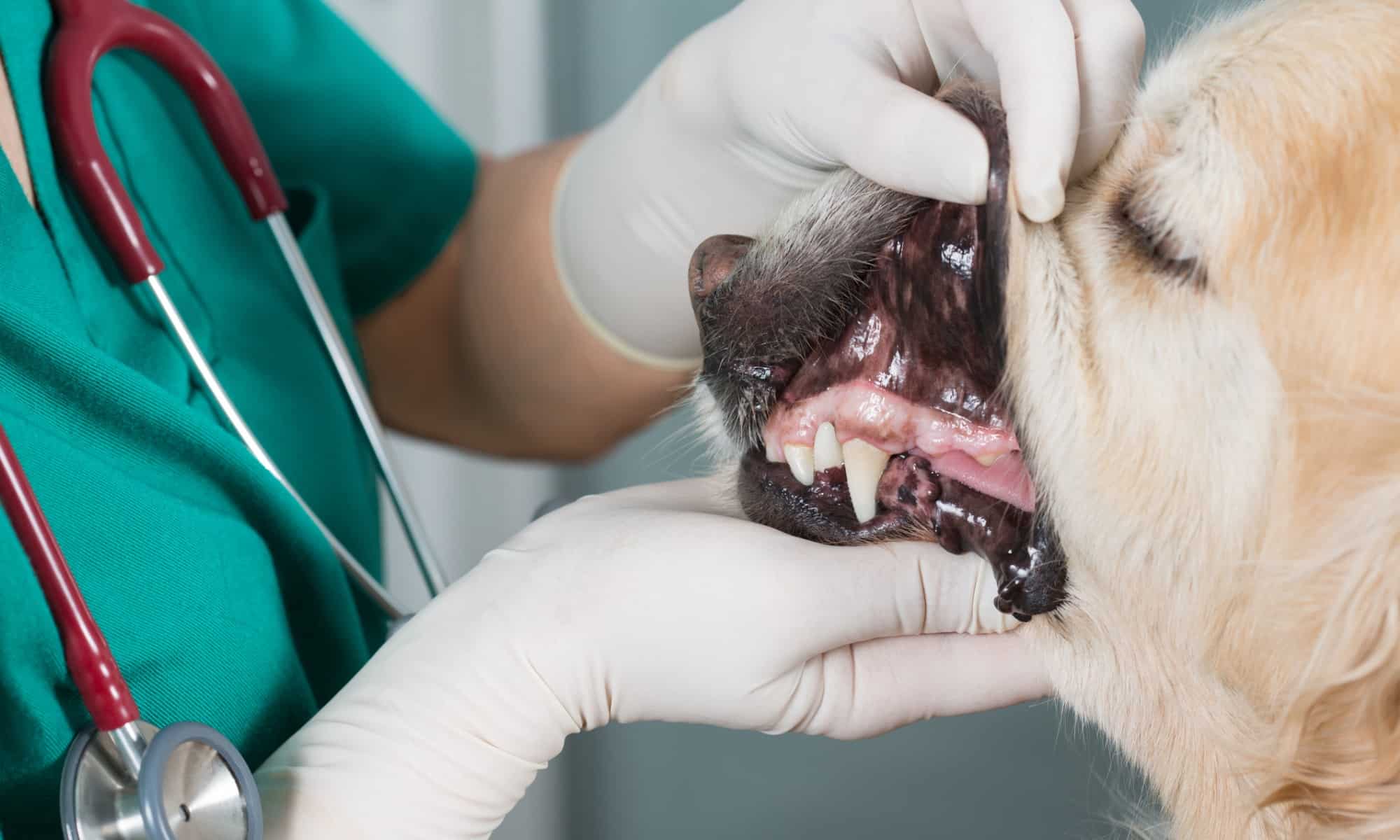Many people love dogs. In fact, some people don’t want to live without a dog in their home. Golden retrievers are one of the most popular dogs out there, as they are known for being friendly and gentle. They are one of the most family-friendly dog breeds.
If you have a golden retriever, it would be a good idea to learn about his or her teeth. This can help you with dental care, as well as understanding how your dog eats. Keep reading to learn all about golden retriever teeth!
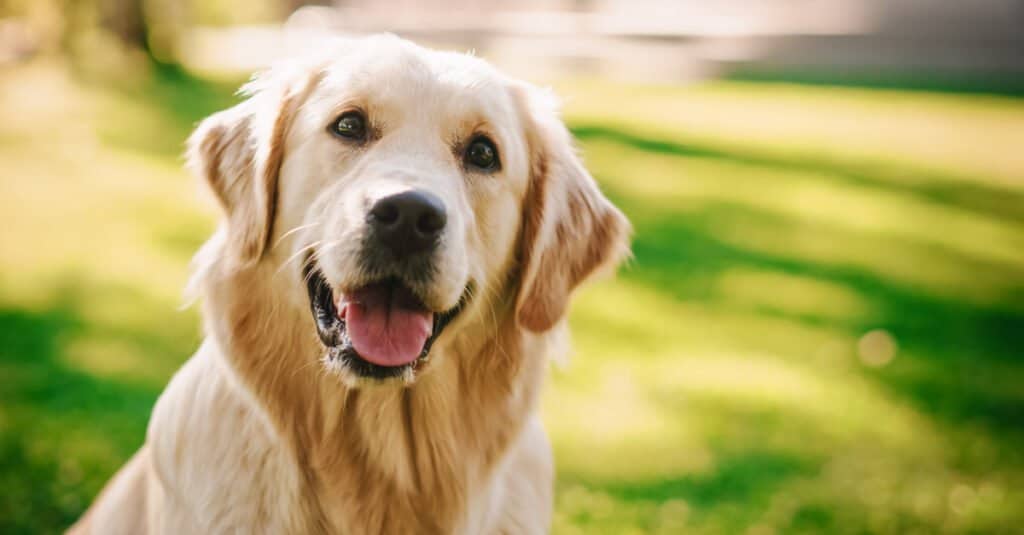
Golden retrievers are one of the most family-friendly dog breeds due to their gentle nature.
©Gorodenkoff/Shutterstock.com
Adult Golden Retriever Teeth
Adult dogs typically have a total of 42 teeth. They have 20 on their top jaw and 22 on the bottom jaw. If your adult dog has fewer than 42 teeth, it’s likely because they have broken or lost a tooth.
Types of Golden Retriever Teeth
Golden retrievers and other dogs have four different types of teeth. Each of these tooth types has a different function in chewing.
Incisors
The incisors are the small teeth at the front of the dog’s mouth. The dog uses them for scraping. If your dog was a wild animal, these teeth would be the ideal shape for scraping meat from the bones of prey.
Additionally, dogs use their incisor teeth when they groom themselves. They nibble at their coats to remove fleas and ticks. They also use their incisors to remove and kill parasites.
Canines
The canines are perhaps the most prominent teeth in your golden retriever’s mouth. They are the long, pointed teeth towards the front. The chief purpose of these teeth is to tear food apart, particularly meat.
Your dog will also use these teeth to grip an item he or she has in his mouth, like a chew toy. A dog has four canine teeth, two on the upper jaw and two on the lower jaw.
Pre-Molars
These are teeth with sharp edges behind the canines. Your dog uses them to chew and shred food. If you ever see your golden retriever chewing a meaty bone using the side of their mouth, they are trying to shred the meat off of the bone.
Molars
Molars are located at the back of a dog’s mouth. They are primarily used to break down hard foods, such as dry dog food and biscuits.
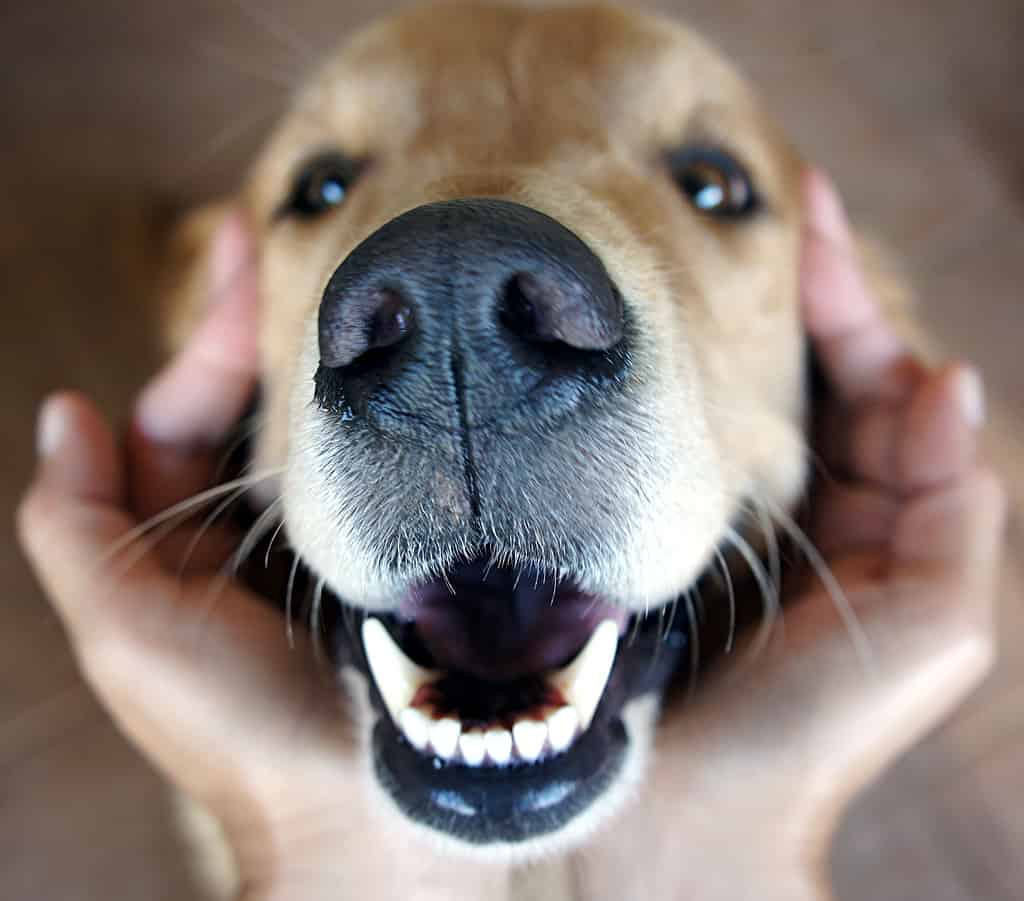
Adult golden retrievers typically have 20 teeth on their top jaw and 22 on their bottom jaw for a total of 42.
©iStock.com/Mercedes Cavani
Golden Retriever Puppy Teeth
Golden retriever puppies do not start out with the 42 teeth that their adult counterparts have. Before this, they have baby teeth, of which there are only 28.
At birth, golden retriever puppies have no teeth. They are nursing and do not need them. Between two and four weeks of age, their first baby teeth begin to appear. The incisors come in first.
At three to five weeks, their baby canine teeth will come in. They get their premolars between four and six weeks of age.
While puppies are teething, there are some common behaviors that you may see. Excessive chewing is one of them. Chewing is fairly natural and commonplace in all dogs, but teething can exacerbate this quite a bit. Puppies do this in an effort to comfort themselves.
Drooling is also very common, due to increased saliva production while teething. Puppies will typically outgrow this when they get their adult teeth.
Teething can be somewhat painful for puppies. They may experience soreness and inflammation in the gums. In order to help your puppy cope with these growing pains, it would be very helpful for you to get your puppy soft chew toys, soft or wet foods, and possibly a cold compress.
If you feel that any of your puppy’s behaviors are abnormal, take the puppy to your vet to be on the safe side.
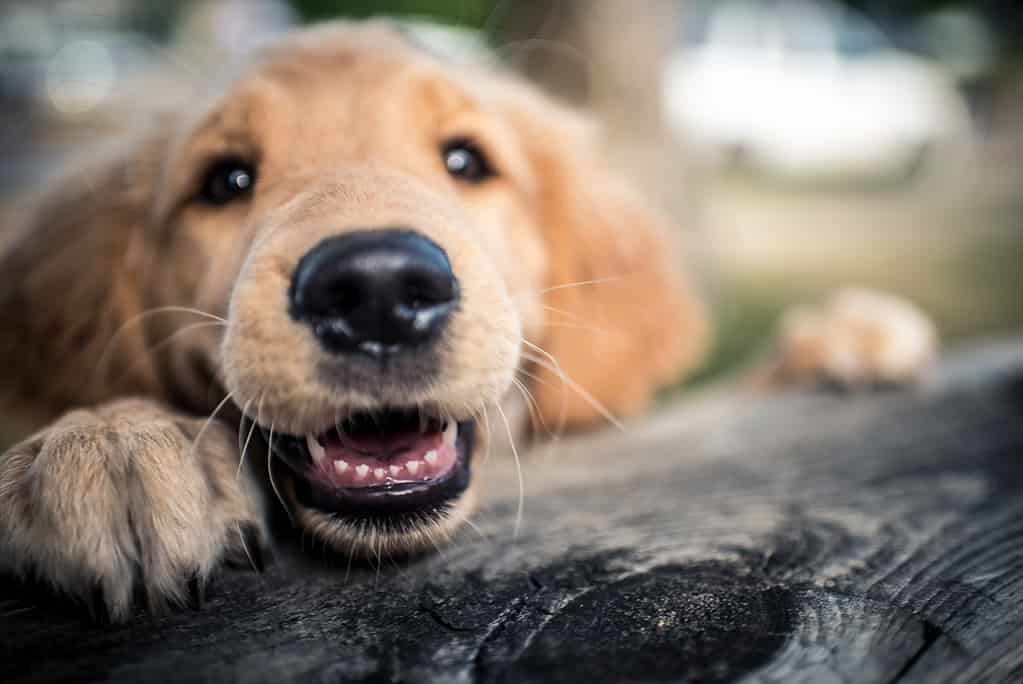
Golden retriever puppies first grow 28 baby teeth before later developing adult teeth.
©iStock.com/exies
What Do Golden Retrievers Eat?
Most golden retrievers likely eat generic dog food, which consists of a source of protein (such as fish, chicken, or beef), cereals (basic carbohydrates, such as grain), vegetables, fats/oils, sodium, and chloride. However, if domesticated dogs were out in the wild, they would be catching and eating their own prey.
Dogs are carnivores, so they would primarily be consuming prey out in the wild. An individual dog will likely go after small animals, such as birds, rabbits, rodents, voles, and insects. If the dog is part of a pack, they can work together to catch larger prey.
However, they are not obligate carnivores like cats. They can eat vegetable matter as well, such as vegetables, fruits, herbs, and grasses. They are also scavengers and will eat leftover matter from dead animals, including decaying flesh, vomit, and feces.
A golden retriever’s set of teeth equips them to properly tear apart and consume all of the matter that they would be eating were they living out in the wild.
Dental Care for a Golden Retriever
Golden retrievers are not one of the dog breeds that are predisposed to dental problems. However, one of the most common issues affecting dogs, including golden retrievers, is dental disease. Some people are not aware of the fact that dogs need their owners to clean their teeth regularly to prevent potentially painful dental conditions.
The most important thing to do is to brush your golden retriever’s teeth every day. This will remove food particles and plaque so that residue does not build up. If they accumulate tartar on their teeth, this can lead to infections around the roots of the teeth or underneath the gums. This can cause a great deal of pain, loose teeth, and abscesses.
Make sure that you are using dog-safe toothpaste. It should not have ingredients that are toxic to dogs, such as xylitol. Do not use your own toothpaste on your dog. There are specific dog toothpastes that you can buy. Most of the time, your dog will be able to swallow this as you’re brushing his or her teeth.
Some dogs will not allow you to brush their teeth, and dental chews can be helpful in this situation. Prescription dental care dog food and dental wipes are also helpful. You will likely need to have your dog’s teeth cleaned by a veterinarian once or twice in his or her lifetime.
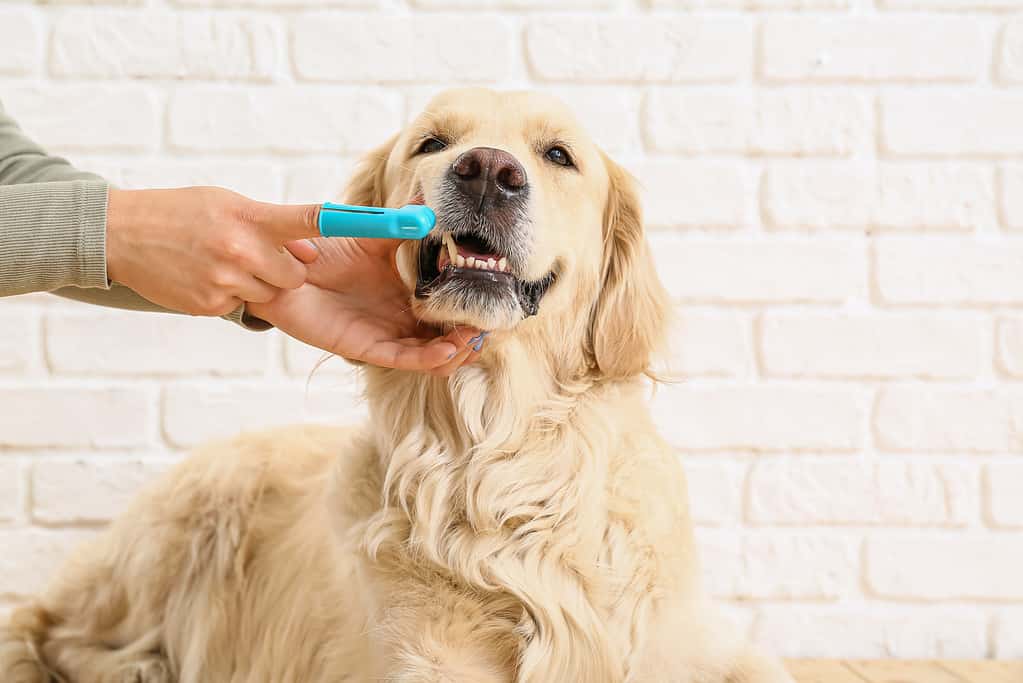
Brushing your golden retriever’s teeth on a regular basis will help to remove food particles and plaque so that residue does not build up.
©Pixel-Shot/Shutterstock.com
Ready to discover the top 10 cutest dog breeds in the entire world?
How about the fastest dogs, the largest dogs and those that are -- quite frankly -- just the kindest dogs on the planet? Each day, AZ Animals sends out lists just like this to our thousands of email subscribers. And the best part? It's FREE. Join today by entering your email below.
Thank you for reading! Have some feedback for us? Contact the AZ Animals editorial team.

